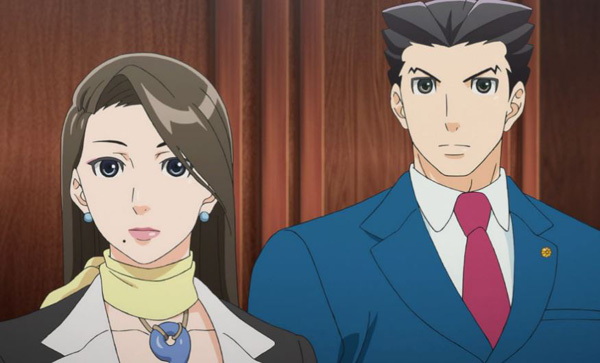
Capcom’s Ace Attorney games have been delivering memorable characters and scenarios on Nintendo’s portable systems since the first Gyakuten Saiban game launched on Game Boy Advance in Japan back in 2001. It didn’t take long for the Nintendo DS port to gain an audience in the West as Phoenix Wright: Ace Attorney, and thus an unlikely hero was born. Ryuichi Naruhodo, aka Phoenix Wright, is a hero who has spent the better part of the past 15 years consistently second guessing himself, shouting “OBJECTION!” at the smallest of inconsistencies, and developing an unforgettable rivalry with prosecutor Reiji Mitsurugi, aka Miles Edgeworth. Thanks to the format, he’s exactly as competent at defending the accused as YOU are at sussing out the truth behind the often bizarre mysteries on trial.
A wonderfully over-the-top cast with infinitely rewatchable sprite animations has made the Ace Attorney series one of the most distinctly anime games to ever not be based on an existing anime. Later entries in the series blurred the lines further with anime cutscenes, with both Ace Attorney: Dual Destinies and spinoff entry Professor Layton vs. Ace Attorney featuring animation from anime studio Bones (Fullmetal Alchemist, Eureka Seven).
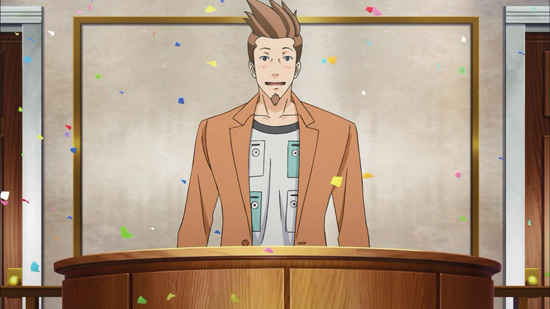
While Bones covered the in-game animation, A-1 Pictures (Sword Art Online, Black Butler, The Seven Deadly Sins) is the studio responsible for bringing Phoenix Wright and the gang to television. With a new game on the not-so-distant horizon, there’s no better time than now to get into the unpredictable courtroom proceedings of Ace Attorney.
From (Dual) Screen to Screen
At this point there are so many aspects of the Ace Attorney games that are iconic to fans, it’s almost hard to believe a studio was able to settle on what to cover. Maybe that’s why it makes so much sense for the Ace Attorney anime to take us right back to the series’ roots, adapting the story of the first game pretty much beat for beat. When we first meet our plucky hero he’s brand new to the job of defense attorney as he’s taken under the capable wing of his mentor Mia Fey. His first taste of the court just so happens to involve an old childhood friend, known as Larry Butz in the localized version, who is accused of a murder most foul.
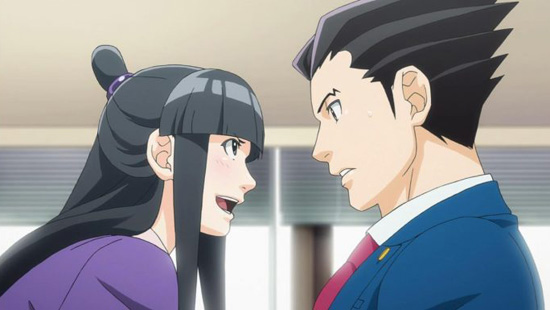
While Mia successfully gets Larry off the hook, she ends up being murdered herself, placing the entire weight of the defense on Phoenix. This time the alleged culprit is Mia’s younger sister Maya, a medium-in-training who would never harm her own flesh and blood. That doesn’t stop the relentless Miles Edgeworth from coming on board as prosecutor for the case, kicking off one hell of a rivalry between him and long-time friend Phoenix. So dogged is his pursuit of victory that he comes on extra hard when Phoenix himself ends up becoming suspect numero uno in the murder of Mia Fey, and that’s pretty much the backbone of the first trial and the first four episodes of the Ace Attorney anime.
Taking the basic story of “Turnabout Sisters” and animating it seems like a simple enough task, but it’s a much more demanding process when you take the very essence of the game series into consideration. I can’t speak for everyone, but the Phoenix Wright that I control is pretty stupid. He constantly makes mistakes and jumps to the wrong conclusions, often landing him in hot water with the so-gullible-he’s-charming Judge. It would be a serious embarrassment to admit how many times I’ve actually failed a trial, seeing the dreaded GUILTY verdict pop up on screen and sighing before going through reams of text all over again.
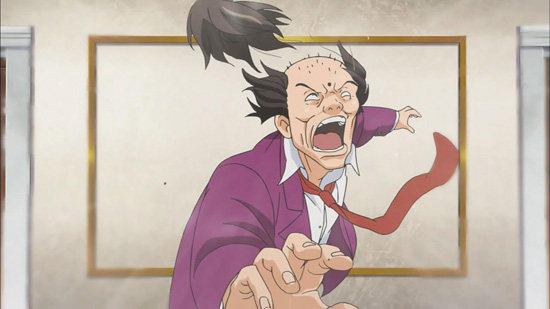
Somehow, though, the Ace Attorney anime manages to convey the basic essence of how Phoenix operates as a game character. He’s not infallible, so this is far from a “perfect” run-through of the trials. Series composition writer Atsuhiro Tomioka—who has had plenty of experience bringing games to the TV screen, including work on Pokémon, Battle Spirits, Inazuma Eleven, and Blade & Soul—does a good job of balancing the ups and downs of each trial. Phoenix doesn’t just go through all the correct options like you’re watching a flawless speedrun of the first game; he makes plenty of mistakes and contributes nicely to both the tension and comedy of each situation.
Throwing the Joke Book at ‘Em
Speaking of comedy, that’s one of the most consistent cornerstones of the Ace Attorney franchise, which has spanned five main entries, with a sixth coming soon, as well as a number of spinoffs like the Edgeworth-centric Investigations series. That means the games have had plenty of time to thoroughly develop their brand of humor, and it carries over nicely to A-1 Pictures’ adaptation. While there are a number of factors that make this possible, including the writing itself, it’s safe to say director Ayumu Watanabe has had plenty of influence over the tone.
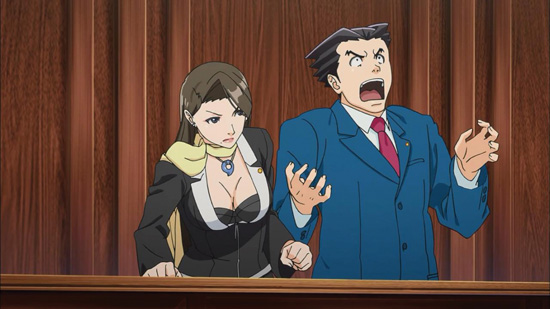
Watanabe’s past directorial works are varied, and they include the 99-episode anime adaptation of Chuya Koyama’s Space Brothers manga—also produced at A-1 Pictures and available in North America from Sentai Filmworks—and Hoods Entertainment’s 2014 anime adaptation of Toka Takei’s If Her Flag Breaks (Kanojo ga Flag o Oraretara) light novels, among others. Perhaps most helpful to the comedic timing of Ace Attorney, however, is Watanabe’s extensive experience directing Doraemon films, from 1998’s Doraemon Comes Back to 2008’s Nobita to Midori no Kyojinden (Nobita and the Green Giant Legend).
The animation might not be mind blowing, but it’s especially good at recreating the famous ticks of every witness on the cross-examination block. Larry Butz’s dopey demeanor remains intact, as do the glittering, bigwig show-off stylings of Bluecorp CEO Redd White, one of the most ridiculously American characters ever. Topping it all off are the iconic displays of “OBJECTION!” and “HOLD IT!,” all backed by Kaoru Wada’s take on the familiar background tunes by game composers Masakazu Sugimori and Naoto Tanaka. At the time of this writing, the anime is just wrapping up the second trial, “Turnabout Samurai,” but it’s supposed to adapt the first and second games throughout its listed 24-episode run. Whether you’re a longtime fan or new to the series, this is a great way to get into Ace Attorney. And hey, at least if any of these trials end in a guilty verdict it won’t be your fault.

